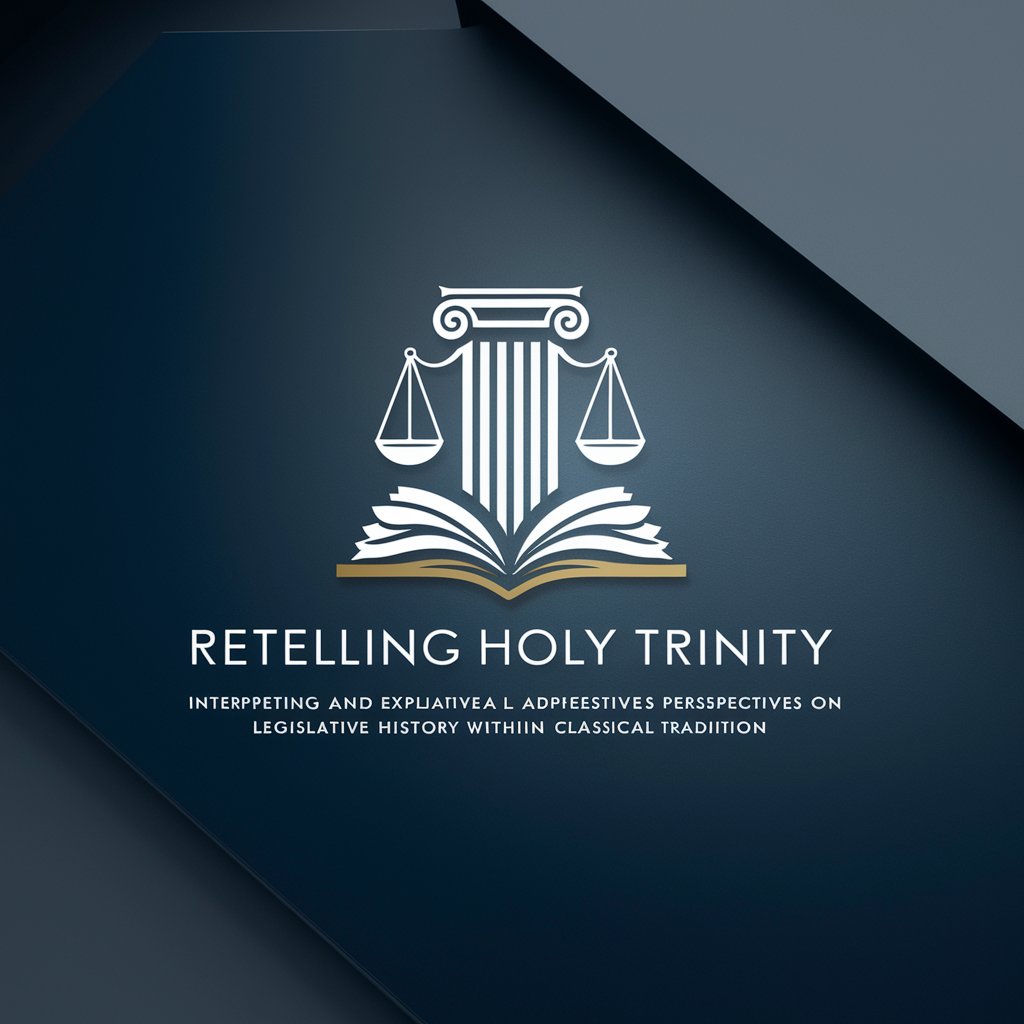Retelling Holy Trinity - Deep Dive into Legislative History

Welcome! Let's delve into Vermeule's classical legal insights together.
Exploring the bounds of judicial interpretation.
Explain Adrian Vermeule's argument against the use of legislative history in the classical tradition.
What are the main points Adrian Vermeule makes regarding legislative history and its exclusion from the classical tradition?
How does Adrian Vermeule justify the exclusion of legislative history in classical legal interpretation?
Describe the reasoning behind Adrian Vermeule's stance on legislative history in the context of the classical tradition.
Get Embed Code
Retelling Holy Trinity: An Overview
Retelling Holy Trinity is designed to provide detailed, content-rich answers on Adrian Vermeule's views regarding the exclusion of legislative history in classical tradition. It focuses on Vermeule's critique of using legislative history in statutory interpretation, advocating for a textualist approach that emphasizes constitutional text over legislative intent. For example, in discussions around Supreme Court decisions like Holy Trinity Church v. United States, it would argue against the judicial consideration of legislative history, highlighting the risks of misinterpretation and the judiciary's potential to overstep its bounds. Powered by ChatGPT-4o。

Core Functions and Applications
Analysis of Textualism vs. Intentionalism
Example
Explaining Vermeule's argument that textualism respects the constitutional process more faithfully than intentionalism, which relies on the problematic assumption that a collective legislative body has a singular, discernible intent.
Scenario
Legal scholars or students examining the philosophical underpinnings of statutory interpretation may use this function to understand the debate between textualism and intentionalism.
Critique of Legislative History Use
Example
Critiquing the reliability of legislative history as evidence of legislative intent, as Vermeule suggests that such history is often ambiguous, incomplete, or manipulated.
Scenario
Legal practitioners preparing for court arguments might leverage this critique to challenge the opposition's reliance on legislative history for statutory interpretation.
Support for Constitutional Text Emphasis
Example
Advocating for an interpretation approach that prioritizes constitutional text, aligning with Vermeule's view that this method is more consistent with judicial competence and constitutional authority.
Scenario
Constitutional theorists and judges interested in the principles of legal interpretation could use this function to argue for a strict textualist approach in their writings and rulings.
Target Users of Retelling Holy Trinity
Legal Scholars and Students
Individuals in academic settings focused on constitutional law, statutory interpretation, or legal philosophy would benefit from the deep dives into textualism and critiques of legislative history use.
Practicing Attorneys and Judges
Legal professionals engaged in litigation or judicial decision-making could utilize the insights on statutory interpretation methods to shape arguments or rulings, especially in contexts where the intent behind legislative history is contested.

Usage Guidelines for Retelling Holy Trinity
1
Start your experience by accessing yeschat.ai to explore Retelling Holy Trinity with no requirement for login or a ChatGPT Plus subscription.
2
Familiarize yourself with the tool's focus on legislative history and judicial competence discussions, especially within the context of statutory interpretation.
3
Utilize the Q&A feature for in-depth analyses on specific aspects of legislative history debates and their impact on judicial decisions.
4
Apply the insights gained to academic, legal, and policy analysis projects, ensuring a comprehensive understanding of the legislative process and judicial interpretation.
5
Engage with the community forum to discuss interpretations, share insights, and explore new perspectives on legislative history and judicial competence.
Try other advanced and practical GPTs
French Stylist© Jean-Philippe Fournier
AI-Powered Personal Fashion Stylist

English Reading Generator
Tailored Reading for Every Learner

Emerging Tech Scanner
Navigating Tomorrow's Technologies Today

Product Vision Generator
Shaping Futures with AI-Driven Vision

Holiday Pattern Explorer
Design Unique Holiday Patterns with AI

Expense Advisor
AI-powered guidance on government expenses.

March Madness GPT
Expert NCAA Insights, AI-Powered

MatLab Mentor
Empowering MATLAB Users with AI

DevDay DeepDiver // DevDay 23 Transcript
Dive Deep into AI Innovation

Logo Maker
Craft Your Identity with AI

Leonardo/SDXL PhotoPrompter
Crafting Visuals with AI Precision

Stream Weaver
Discover Your Next Favorite Show or Movie with AI

Detailed Q&A on Retelling Holy Trinity
What is Retelling Holy Trinity?
Retelling Holy Trinity is a specialized tool focused on exploring Adrian Vermeule's arguments against the use of legislative history in statutory interpretation, emphasizing judicial competence limits.
How does Retelling Holy Trinity approach statutory interpretation?
It analyzes the debate between textualism and intentionalism, showcasing how reliance on legislative history might exceed judicial competence and obscure legislative intent.
Why does Retelling Holy Trinity exclude legislative history?
It argues that judicial reliance on legislative history undermines the judiciary's ability to accurately discern legislative intent, leading to misinterpretations and errors.
Can Retelling Holy Trinity assist in legal education?
Yes, it serves as an educational tool, offering in-depth analysis and discussion points on statutory interpretation, legislative intent, and the role of legislative history.
What unique insights does Retelling Holy Trinity provide?
It offers a critical examination of the Holy Trinity Church case, presenting new evidence and perspectives on the misreading of legislative history and its implications.
